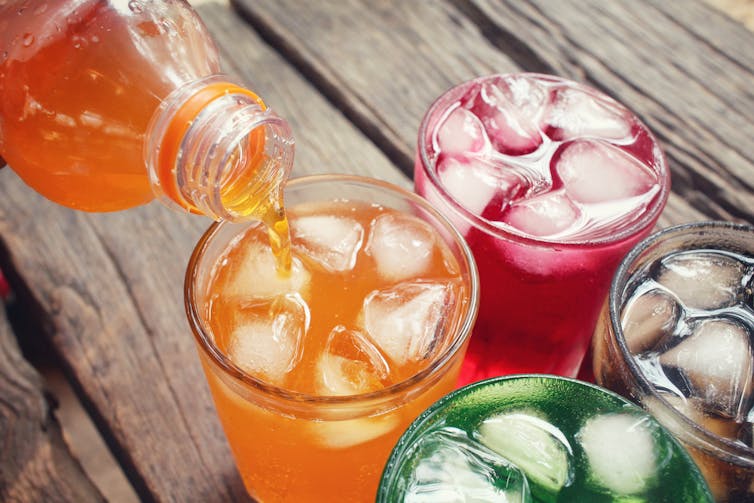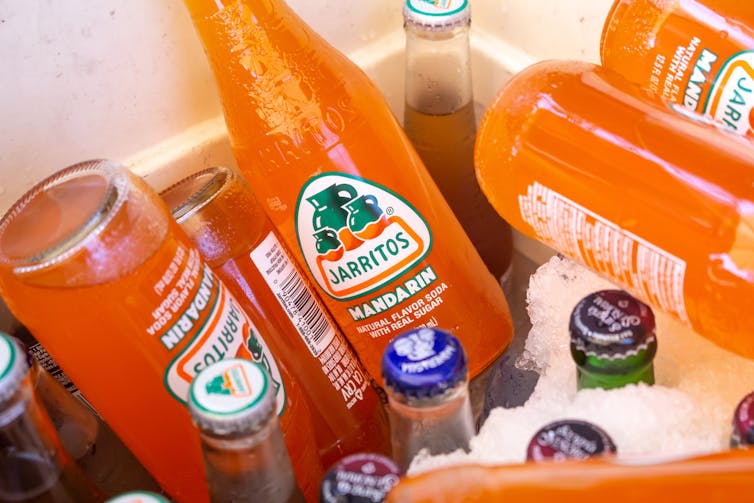How much longer do we need to wait for Australia to implement a sugary drinks tax?
- Written by Gary Sacks, Associate Professor, Deakin University
The Australian Medical Association (AMA) has once again called for[1] a tax on sugary drinks in Australia. This time, the proposed tax is a key part of the AMA’s blueprint[2] to make Australia the healthiest country in the world.
The strong call for a sugary drinks tax echoes the concerted campaign[3] by 2020 Australian of the Year, Dr James Muecke.
And it follows years of advocacy from public health groups[4] and think tanks[5] that have long-argued the many potential benefits of a sugary drinks tax for Australia.
Read more: Let’s 'declare war on type 2 diabetes' – Australian of the year James Muecke on why we need to cut back on sugar[6]
What does the evidence say?
A sugary drinks tax is consistently identified[7] as a critical part of efforts to improve our diets and prevent obesity.
There is strong evidence[8] linking sugary drink consumption to a range of negative health effects including tooth decay, excess weight gain, and increased risk of developing obesity and type 2 diabetes.
International evidence[9] clearly shows sugary drinks taxes are effective in reducing consumption of the taxed products.
Available evaluations[10] have also consistently shown taxes on sugary drinks lead to increases in purchases of untaxed drinks, particularly bottled water. These effects have been shown to persist over many years.
What tax design works best?
The AMA proposes[11] Australia implement a tax of A$0.40 per 100 grams of sugar (per unit of product). Under the proposed tax rate, the amount of tax paid on a 375ml can of Coke with 40g sugar (sugar content is 10.6g/100ml) would be A$0.16.
This tax rate is consistent with global recommendations[12] that price increases of at least 20% are needed to have a meaningful health effect.
 Higher prices encourage people to choose healthier options, like bottled water.
Shutterstock[13]
Higher prices encourage people to choose healthier options, like bottled water.
Shutterstock[13]
The proposed AMA tax design is also in line with international evidence[14] that shows sugary drink taxes work best when the tax rate is based on sugar content.
These taxes can incentivise people to switch to healthier (lower sugar) substitutes while simultaneously incentivising manufacturers to reformulate their products (lowering the sugar content) to avoid a higher tax rate.
For example, the UK has documented[15] success with a tiered approach, whereby products with sugar content above particular thresholds attract high tax rates. The UK tax has led to decreases in consumption and impressive levels of reformulation[16].
Read more: Sugary drinks tax is working – now it's time to target cakes, biscuits and snacks[17]
The products to be taxed under the AMA proposal include all non-alcoholic drinks containing free sugars, but exclude 100% fruit juice, milk-based and cordial drinks.
Given the international and Australian evidence of the fierce opposition[18] to sugary drinks taxes from the food industry, practical decisions such as this are likely to help reduce resistance to the tax (from fruit growers, for example, and the dairy industry).
Impact of a sugary drinks tax in Australia
The AMA estimates the proposed tax would lead to reduced sugar consumption, improved diets and a 2% reduction in obesity[19].
Over a 25-year period, modelling[20] has shown this would result in 16,000 fewer cases of type 2 diabetes, 4,400 fewer cases of heart disease, 1,100 fewer cases of stroke, and 1,600 fewer deaths.
Read more: Australian sugary drinks tax could prevent thousands of heart attacks and strokes and save 1,600 lives[21]
These health benefits would translate[22] to health-care expenditure savings of between A$609 million and A$1.73 billion.
The AMA estimates the tax would raise government revenue of around A$800 million each year. This revenue could be earmarked for preventive health initiatives.
International groundswell of support for sugary drinks taxes
There is global momentum behind sugary drinks taxes.
Sugary drinks taxes are now in place in more than 45 countries[23] around the world. The majority of these taxes have been implemented in the last five years.
 Sugary drinks taxes now operate in 45 countries, including Mexico.
Shutterstock[24]
Sugary drinks taxes now operate in 45 countries, including Mexico.
Shutterstock[24]
While Australia led the world in preventive health for many decades through strong action on tobacco control[25], it is now lagging far behind[26] in efforts to address unhealthy diets.
Arguments against sugary drinks taxes
The food industry routinely parades a range of arguments[27] against sugary drinks taxes. But their arguments have been thoroughly debunked[28].
Read more: Don't believe the myths – taxing sugary drinks makes us drink less of it[29]
For example, the food industry has argued[30] a sugary drinks tax would leave disadvantaged people poorer.
But rigorous studies[31] indicate lower socioeconomic groups would likely experience a disproportionate health benefit as a result of the tax.
Industry has also claimed[32] there would be job losses for sugar producers.
The AMA report makes it clear a sugary drinks tax in Australia would have minimal impact on Australia’s sugar industry. This is because about 80%[33] of Australia’s domestic sugar production is exported.
Time to put health above corporate profits
The failure of the Australian government to implement a sugary drinks tax is a clear case of putting corporate interests ahead of population health.
Given the powerful evidence indicating the likely benefits and strong public support[34] for a sugary drinks tax, its implementation in Australia feels inevitable.
All that’s needed is political leadership that recognises the value of prioritising health above the profits of a select few multinational soft drinks manufacturers.
Read more: Sweet power: the politics of sugar, sugary drinks and poor nutrition in Australia[35]
References
- ^ once again called for (ama.com.au)
- ^ blueprint (ama.com.au)
- ^ campaign (www.abc.net.au)
- ^ public health groups (www.opc.org.au)
- ^ think tanks (grattan.edu.au)
- ^ Let’s 'declare war on type 2 diabetes' – Australian of the year James Muecke on why we need to cut back on sugar (theconversation.com)
- ^ consistently identified (www.who.int)
- ^ evidence (openknowledge.worldbank.org)
- ^ International evidence (pubmed.ncbi.nlm.nih.gov)
- ^ evaluations (pubmed.ncbi.nlm.nih.gov)
- ^ proposes (ama.com.au)
- ^ global recommendations (openknowledge.worldbank.org)
- ^ Shutterstock (www.shutterstock.com)
- ^ international evidence (journals.plos.org)
- ^ documented (www.bmj.com)
- ^ reformulation (journals.plos.org)
- ^ Sugary drinks tax is working – now it's time to target cakes, biscuits and snacks (theconversation.com)
- ^ fierce opposition (globalizationandhealth.biomedcentral.com)
- ^ 2% reduction in obesity (ama.com.au)
- ^ modelling (theconversation.com)
- ^ Australian sugary drinks tax could prevent thousands of heart attacks and strokes and save 1,600 lives (theconversation.com)
- ^ translate (ama.com.au)
- ^ 45 countries (openknowledge.worldbank.org)
- ^ Shutterstock (www.shutterstock.com)
- ^ tobacco control (tobaccocontrol.bmj.com)
- ^ far behind (6caf7727-1efc-419a-8b13-d58f79d7351f.filesusr.com)
- ^ range of arguments (www.obesityevidencehub.org.au)
- ^ thoroughly debunked (theconversation.com)
- ^ Don't believe the myths – taxing sugary drinks makes us drink less of it (theconversation.com)
- ^ argued (theconversation.com)
- ^ rigorous studies (journals.plos.org)
- ^ claimed (www.britishsoftdrinks.com)
- ^ about 80% (grattan.edu.au)
- ^ strong public support (bmjopen.bmj.com)
- ^ Sweet power: the politics of sugar, sugary drinks and poor nutrition in Australia (theconversation.com)

















